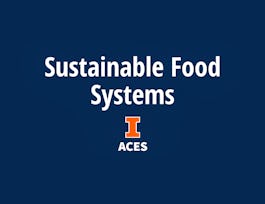The UN predicts we will be 9-10 billion people on Earth in 2050. Providing so many people with nutritious foods is a massive challenge and one that cannot be met by simply upscaling current practices regarding food production and consumption. Providing humanity with nutritional food is at the center of all decisions related to sustainable development.


Transformation of the Global Food System
Taught in English
Some content may not be translated
24,694 already enrolled
(915 reviews)
Details to know

Add to your LinkedIn profile
6 quizzes
See how employees at top companies are mastering in-demand skills


Earn a career certificate
Add this credential to your LinkedIn profile, resume, or CV
Share it on social media and in your performance review

There are 6 modules in this course
This first module is an introduction to the challenges facing society when we talk about the global food system. The Doughnut Economics and Planetary Boundaries frameworks are presented and the crucial role of the global food system described. Four areas of intervention in terms of transforming the global food system are identified. In addition, the four “levers” or “tools” identified in the UN 2019 Global Sustainable Development Report that society has at its disposal to transform the global food system are presented: Technology, Governance, Finance and Behavioral Change. These levers are all further developed in the following modules.
What's included
1 video4 readings1 quiz1 discussion prompt
One of the essential elements for bringing the global food system onto a sustainable trajectory, is boosting, i.e., improving conditions for small-scale farmers, especially in the Global South. In this module, we look at the major challenges confronting small-scale farmers when it comes to access to information, finance, fertilizers, etc. These challenges can be met through the use of existing technologies, government intervention, and consumer awareness.
What's included
5 videos1 quiz1 discussion prompt
The second essential element in a sustainable transformation of the global food system takes focuses on changes in industrialized, large-scale agricultural production. These practices must be changed in order to have a sustainable food system. This module identifies some of the kinds of changes needed and presents case studies showing how some actors are beginning the transformation process.
What's included
3 videos2 readings1 quiz1 discussion prompt
The third essential element for transforming the global food system is reducing food loss and waste. Today, about a third of all of the food produced is never consumed. Thus, no nutritional value was created for the environmental degradation associated with the production of a large percentage of the food produced. If we can limit food loss and waste, it will be possible to stay within our planetary boundaries while feeding the increasing world population. A challenge in reducing this loss and waste is actually climate change. This module examines strategies for reducing food loss and waste.
What's included
3 videos1 reading1 quiz1 discussion prompt
The fourth and final essential element for achieving a sustainable food system is changing our diets. While an increasing population in the Global South will need access to nutrient-rich foods, the Global North will have to make room for this development by eating smarter. Meat production is especially damaging to the climate and environment. Many people’s health would benefit by eating less meat and it is possible to easily replace meat with alternative sources of protein. This module focuses on when and how it is easiest to change eating habits and what we need to change them to!
What's included
4 videos1 reading1 quiz1 discussion prompt
The Finale. In this module, we examine what it would mean for the global food system if the potentials identified through Boosting the Small, Transforming the Big, Losing Less, and Eating Smarter were to be combined. The module argues that it is possible to develop a global food system that can meet the nutritional needs of 9-10 billion people without destroying the environment and while keeping global warming within the 1.5 - 2 degrees Celcius guardrail identified in the Paris Agreement. Doing so will, however, require a strong focus on transforming the global food system.
What's included
1 video1 reading1 quiz1 discussion prompt
Instructor

Offered by
Recommended if you're interested in Environmental Science and Sustainability

University of Illinois at Urbana-Champaign

Università Bocconi

Coursera Project Network

University of Pennsylvania
Why people choose Coursera for their career




Learner reviews
Showing 3 of 915
915 reviews
- 5 stars
82.86%
- 4 stars
14.62%
- 3 stars
1.96%
- 2 stars
0.21%
- 1 star
0.32%

Open new doors with Coursera Plus
Unlimited access to 7,000+ world-class courses, hands-on projects, and job-ready certificate programs - all included in your subscription
Advance your career with an online degree
Earn a degree from world-class universities - 100% online
Join over 3,400 global companies that choose Coursera for Business
Upskill your employees to excel in the digital economy
Frequently asked questions
Access to lectures and assignments depends on your type of enrollment. If you take a course in audit mode, you will be able to see most course materials for free. To access graded assignments and to earn a Certificate, you will need to purchase the Certificate experience, during or after your audit. If you don't see the audit option:
The course may not offer an audit option. You can try a Free Trial instead, or apply for Financial Aid.
The course may offer 'Full Course, No Certificate' instead. This option lets you see all course materials, submit required assessments, and get a final grade. This also means that you will not be able to purchase a Certificate experience.
When you purchase a Certificate you get access to all course materials, including graded assignments. Upon completing the course, your electronic Certificate will be added to your Accomplishments page - from there, you can print your Certificate or add it to your LinkedIn profile. If you only want to read and view the course content, you can audit the course for free.
You will be eligible for a full refund until two weeks after your payment date, or (for courses that have just launched) until two weeks after the first session of the course begins, whichever is later. You cannot receive a refund once you’ve earned a Course Certificate, even if you complete the course within the two-week refund period. See our full refund policy.


